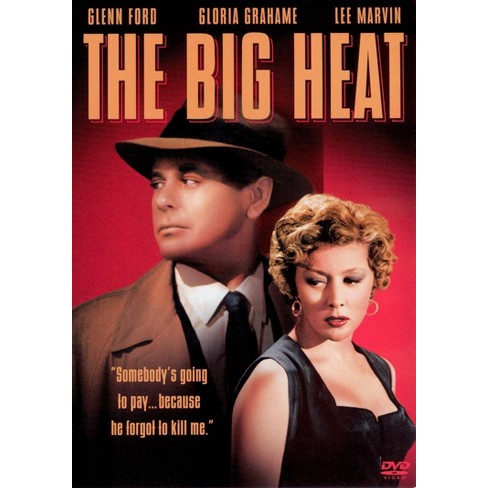The Big Heat: Movie Review

Federalism V. State's Rights (or "Localism")
Police procedurals on the big screen seem to favor federalism; and police procedurals on the small screen of television, tend to favor "state's right's," or what we will call localism, local jurisdiction priority.
What on Earth am I talking about?
Well, on television, the police procedural shows tend to view the federal government (in the form of the FBI primarily), as the boogie man, an unwelcome, intrusive, invading presence. The "feds," as they are usually called, always want information and never want to give it to the locals.
The "feds" are always invoking "national security," or some such, as a justification for interference with local criminal investigations. They always want the locals to cease their investigation of some X figure because of the priority of whatever federal investigation is going on.
On the big screen, "the feds" tend to be regarded as saviors. This, at least, is usually the perspective of an often lone, noble, local cop battling heroically against homegrown corruption. He's holding on until "The Big Heat" comes down cleans out the rot of local institutions, including, regrettably, state or municipal law enforcement.
"The Big Heat," which is the title of the film means simply this: the cleansing wrath of federal intervention.
At one point in the film, the protagonist, played by Glenn Ford as the heroic local cop, invokes this phrase, the very title of the movie, as a kind of prayerful invocation of divine purification from above --- albeit in a gravelly-voiced, hardboiled, matter-of-fact sort of way, worthy of the film noir genre, and its "pulp fiction" literature source material.
Let's stay with the theme of the difference between television police procedurals and movie police procedurals, regarding "The Feds," for just a moment longer.
It's interesting to note that, on television, the "feds" are viewed as an unwelcome, invading, intrusive force, which impedes competent, honest, steadfast, smart, local enforcement of justice. Indeed, we often see the feds as making matters concretely worse, as bringers of corruption to the local situation, rather than the destroyers of malfeasance. The federal government are not depicted as acting like a purifying light from above.
In the movies, as I have said, the depiction of the federal government (through the eyes of a local hero) tends to be quite the opposite.
While it is interesting to contemplate why the two mediums handle the subject of the federal government in such different and opposite ways, the matter will not detain us here.
I will say, however, that it should be obvious that one group of people in the federal government are no more morally enlightened than other groups of people in state and local governments. By the way, we are, of course, focusing this discussion on the United States of America and other politically, economically, legally, and scientifically and technologically comparable world nation-states.
One thing I think we can definitely say is this:
- State or municipal governments are, by their very structure, relatively more inward-looking than national governments. That is to say, the government structure of the former (states and municipalities) makes them more prone to worry about their own affairs; at most, they may be somewhat mindful or what their neighbors in their region are up to; but that's about it.
- National, central, or federal governments are, by their very structure, relatively more mindful of, open to, and, at times, responsive to: What will the neighbors say?
The "neighbors," in question, are other countries in the world, other national governments (and the societies of those countries, as seen through the national, global prism).
Finally, Before Talking About The Movie...
I want to say, here, that I believe that the old "Federalism V. State's Rights" debate is a false one. What I mean is that there is a false, artificially contrived choice to be made.
Healthy, functional countries need to be organized into states, cities, towns, counties, and the like, as efficient, directly associated administrative units, which, by design, are necessarily inward-looking, concerned with the task-at-hand, as it were.
Healthy, functional countries also need to have an over-arching, federally-governing apparatus that, among other things, concerns itself with the big picture of WHAT WILL THE NEIGHBORS SAY?
We understand that countries without a strong national government, with a strong sense of national identity (and a vision of its role in the larger global community), tend drown in corruption --- which, among other things, can be bad for business, since attracting foreign investment, under those circumstances, can be quite problematic.
Now, all countries have corruption, of course. But countries with strong federal government do not appear to drown in corruption. That is to say, that a nation with a strong national government will tend to clamp down on corruption, of some kind, if it threatens to put the nation as a whole, in a bad odor with its global peers.
If this is not so, why is it the case that some crimes are within the jurisdiction of states, cities, counties, towns, and the federal government?
Why is kidnapping (particularly across state lines, as I understand it), in the United States, a matter of federal jurisdiction, as opposed to state or local jurisdiction, for example?
That is because no self-respecting country can stand to be seen as a place where one's very safety, on an existential level, is commonly or regularly at risk. Nobody wants to be known as "The kidnap capital of the Western Hemisphere," for instance.
The United States was particularly concerned with what the neighbors might say during the Cold War, as America found itself pitted against the Soviet Union, in a quest to "win hearts and minds," and all that.
This movie, The Big Heat, was released in 1953, at or around the height of the Cold War. The movie can be enjoyed as a straightforward, competently crafted, well-executed, entertaining, albeit fairly routine man-against-the-machine, hero-quest crime melodrama.
Glenn Ford, in the lead, is charismatic and commanding. Gloria Grahame, in the supporting role, gives an equally compelling, layered performance.
The movie can also be seen as Cold War-era propaganda. And you know something? I think we accidentally stumbled into the reason why "The Feds" are treated differently on the small and big screen.
Perhaps it goes back to the Cold War. Perhaps the United States wanted to show the world that the United States, particularly in the form of its national government clamps down on corruption, making America better for business, better for people, and better for... um... um... oh yeah, FREEDOM!
If you blinked, you missed the review of the movie.
Thank you for reading!








